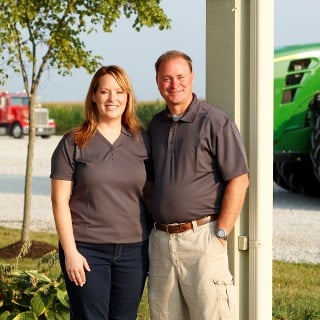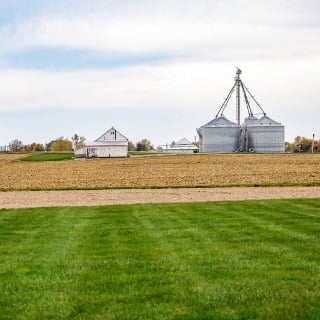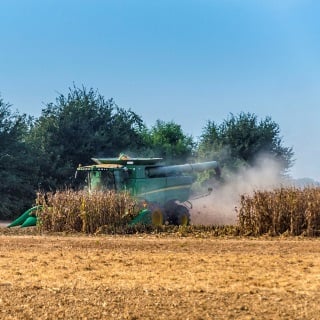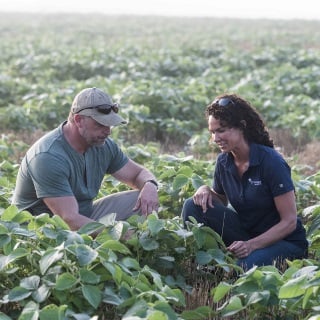Chloe Jefferson didn’t grow up on a farm. In fact, if you ask her to describe her experience with agriculture growing up in Indianapolis, she’ll say, “I kind of knew what 4-H was.”
Tiffany Harper (pictured above), however, spent her childhood on a fifth-generation, diversified crop farm in Oregon. In high school, she served as an FFA officer, and she received her undergraduate degree from Oregon State University on a scholarship from the United States Department of Agriculture.
As different as their childhoods were, both women got involved with the Minorities in Agriculture, Natural Resources and Related Sciences society once they started college; Jefferson at Purdue University and Harper as a graduate student at the University of Kentucky. MANRRS promotes the academic and professional advancement of minorities in agricultural sciences, a field traditionally lacking in minority representation. The organization has chapters for university, high school and junior high students.
“MANRRS provides students with access to mentorship, which is a crucial piece in their professional development,” said Quentin Tyler (pictured above), the national president of MANRRS and director of diversity at the University of Kentucky. “It allows students to see things from a national perspective and, most importantly, it shows them what they can be.”
The Farm Credit System supports the 55 national MANRRS chapters by providing career development resources and opportunities to students involved with the program. At a more local level, Farm Credit Mid-America works closely with the University of Kentucky, Purdue University and other chapters in the four-state area to create workshops and provide internships that can enrich students’ education.
Jefferson did not consider an agriculture-related degree at first as there wasn’t a strong push for those kinds of programs at her high school. She started taking classes in food science and biosecurity, but they weren’t a good fit.
"It didn’t feel right, it felt like something was missing,” said Jefferson. “I didn’t see myself becoming a research scientist," Jefferson said.
When she enrolled in food science, she had no idea the degree was actually offered through the university’s College of Agriculture. Jefferson found herself wanting more marketing and management classes to round out her science education. She eventually switched her major to animal sciences and agribusiness, a degree that offered both a hard science and business background.
Jefferson found MANRRS through the Office of Multicultural Programs. The organization focuses on leadership development in particular, and Jefferson took full advantage of the opportunity. In her sophomore year at Purdue, she served as the chapter historian and social media manager, working her way up to become chapter president during her senior year.
“I really came out of my shell,” Jefferson said. “I would have never seen myself being president of MANRRS. If you had asked me my freshman year, I would have never thought that would be me. MANRRS has really helped me open up professionally and personally.”
As a farm kid, Harper found a very different college and leadership path through MANRRS. She knew she wanted a degree in agriculture, so she was guided to MANRRS through her USDA scholarship. In the organization, she found a powerful support system to help shape her academic career.
After receiving her undergrad degree in crop and soil sciences at Oregon State University, Harper wanted a career that was communication-focused, but still rooted firmly in agriculture. She envisioned herself working with individuals who want to become farmers, but who don’t have traditional agriculture backgrounds, or who want to develop innovative, non-traditional operations. She set her sights on pursuing a graduate degree focusing on education.
It was through the MANRRS network that Harper landed at the University of Kentucky. She reached out to Tyler, who helped her secure a graduate position in the university’s College of Agriculture, Food and Environment. Today, she helps lead the Louisville-area Junior MANRRS program, which conducts outreach to junior high and high school students.
“MANRRS has been this unconditional support system that I haven’t had consistently in my life,” Harper said. “No matter what stage you are at, you always have mentors who are there for you as a student and as you transition to a professional setting. It’s a family you always have.”
In addition to engaging students on campus and in academics, MANRRS helps students develop long-term career skills. In the spring of 2016, Jefferson and Harper received scholarships to attend the Farm Credit VIP Track prior to the annual MANRRS national conference.
The agenda for the day served as a concentrated dose of the kind of career skills MANRRS helps students develop, including sessions on networking with LinkedIn and understanding your own personality from an organizational perspective. A panel of Farm Credit employees introduced career opportunities in agriculture that don’t involve working on a farm.
“I learned how varied agriculture is and how many paths there are. I would have never been exposed to these opportunities without MANRRS,” Jefferson said.
Despite vastly different backgrounds, both Jefferson and Harper have found great value in what MANRRS has to offer students, both professionally and personally.
“MANRRS helped me develop professionally, from tips on my resume to building a network,” Jefferson said. “I found people I could just reach out to with any question I had. It opened up all sorts of opportunities for me.”
“You gain a mentor, and eventually, the program helps you evolve to be a mentor. It’s a place where, if you contribute your time, money or knowledge, you know it will always be a wonderful investment.”
Though Jefferson graduated from Purdue in the spring of 2016, she’s not done with MANRRS or her education. Jefferson hopes to pursue a Master of Business Administration and continue to recruit MANRRS students. She will begin her career at Cargill in the fall of 2016. Harper is currently pursuing her graduate degree and completed an internship with Farm Credit Mid-America during the summer of 2016. She will also continue her work with Junior MANRRS.






